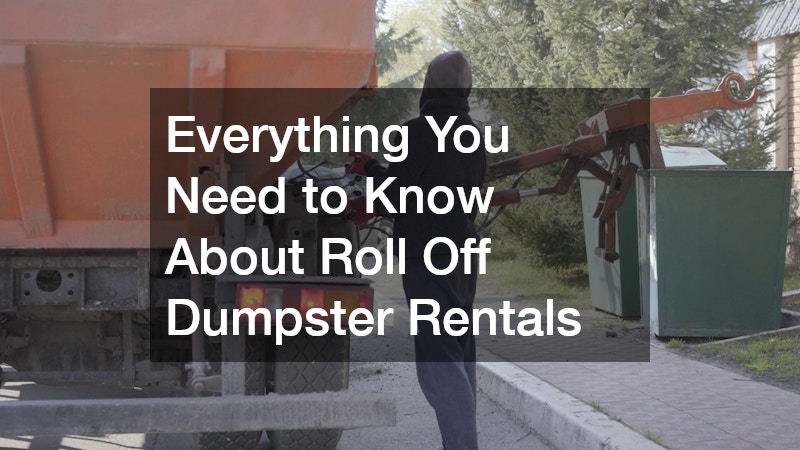Roll off dumpster rentals provide an essential service for individuals and businesses undertaking substantial projects. Whether it’s a construction site, home renovation, or a massive clean-up task, understanding how roll off dumpsters operate is crucial. This article will delve into the many facets of renting a roll off dumpster, including what questions to ask and what factors to consider.
Definition and Purpose
Roll off dumpsters are large, open-top containers designed for large amounts of waste. These dumpsters are typically used for projects that generate significant debris, such as construction, renovation, and large-scale clean-up operations. They provide a streamlined way to collect and remove waste, thus playing a vital role in maintaining clean and safe work environments.
The main purpose of a roll off dumpster is to effectively manage waste generated during large projects. By consolidating debris in a single, easily accessible container, work sites can remain organized and free of hazards. This is particularly beneficial in preventing accidents and reducing the time and effort needed to clear waste from project sites.
Roll off dumpster services are valued for their ability to handle significant volumes of refuse. This capability makes them indispensable for projects where regular waste containers would be inadequate. Consequently, understanding the role of roll off dumpsters can help project managers and homeowners alike allocate resources more effectively.
Types of Roll Off Dumpsters
Roll off dumpsters come in a variety of sizes and configurations tailored to different project needs. Common sizes include 10-yard, 20-yard, 30-yard, and 40-yard containers, each catering to specific volumes of waste. Selecting the right type is crucial to ensure efficiency and to avoid the cost of multiple hauls.
The specifications of a dumpster involve not only its size but also its design and composition. Some roll off dumpsters are equipped with doors for easy loading, while others are reinforced to withstand specific types of waste. Knowing the specific requirements of your project can guide you in choosing a suitably equipped dumpster.
Choosing the Right Size
To determine the correct size of a roll off dumpster, assess the scale and nature of your project. A small home renovation may only require a 10-yard dumpster, while substantial construction projects might need a 40-yard dumpster to accommodate all debris. Choosing accurately not only curtails excess costs but also ensures that the job site remains orderly.
Rental Process and Requirements
The typical rental process begins with an inquiry into available dumpster options and continues with a booking confirmation. This includes providing location details and obtaining any necessary permits for the placement of the dumpster. Ordinarily, companies facilitate this process by handling permit applications and advising on regulatory compliance.
Legal requirements vary across jurisdictions, often influenced by local municipal guidelines concerning waste disposal and public space usage. Compliance with these requirements is paramount and may necessitate documentation from the client. Trustworthy rental companies provide guidance to ensure all legal obligations are met effectively.
Logistical considerations, such as ensuring clear access for dumpster delivery and collection, form part of the rental planning. Site preparation may involve clearing obstructions where the dumpster will be placed. Thoughtful planning ensures a seamless setup and removal process, reducing the impact on project timelines and resources.
Permitted Items
Roll off dumpsters are suitable for various materials like construction debris, furniture, and yard waste. These items fall within the standard categories of non-hazardous waste safely managed by dumpster services. Especially in house cleanouts or renovations, such dumpsters efficiently handle significant waste volumes.
Allowed waste often extends to general trash, including items like old carpeting, drywall, and household items. Awareness of permissible waste items prevents contamination and simplifies the appropriate disposal path. Ensuring all waste aligns with accepted criteria enhances both compliance and waste management processes.
Coordinating with the rental company to list permissible items further clarifies the boundaries of acceptable content. Comprehensive lists ensure all waste within the dumpster meets regulatory standards. This precaution eliminates risks of additional charges or waste being left undealt with.
Proper Disposal Alternatives
For hazardous and prohibited materials, alternative disposal methods are essential to maintain safety and compliance. Many communities offer dedicated facilities for hazardous waste disposal where such materials can be taken for processing. These specialized centers ensure that waste is managed according to environmental regulations.
Recycling drop-offs are widely available for electronic waste and other materials banned from roll off dumpster disposal. Facilities include collection sites that accept specific categories of recyclables, ensuring proper processing. In some cases, manufacturer take-back programs offer rebates or incentives for returning specific products.
Utilizing community resources and recycling centers not only mitigates environmental impact but also conserves valuable materials. Many municipalities provide information on their websites about where these services are available. Responsible waste management decisions contribute to broader sustainability efforts.
In summary, roll off dumpster rentals are a practical solution for efficient and compliant waste management in large-scale projects. Understanding the various aspects of dumpster rental, including item restrictions and pricing factors, empowers individuals and businesses to make informed decisions. With this knowledge, you can choose the right dumpster to meet the needs of your project, ensuring an organized, safe, and environmentally responsible work site.
.




